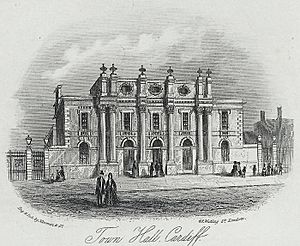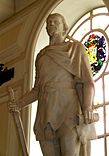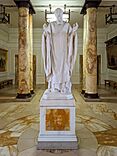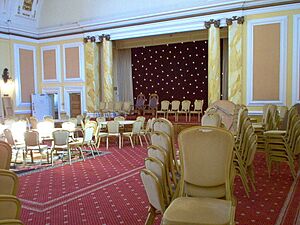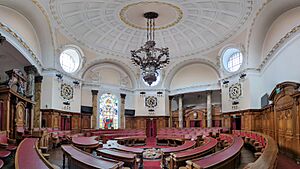City Hall, Cardiff facts for kids
Quick facts for kids Cardiff City Hall |
|
|---|---|
|
Neuadd y ddinas
|
|
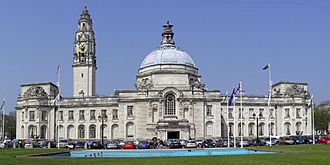
|
|
| General information | |
| Architectural style | Edwardian Baroque style |
|
Listed Building – Grade I
|
|
| Official name: Cardiff City Hall | |
| Designated: | 25 January 1966 |
| Reference #: | 13744 |
| Town or city | Cardiff |
| Country | Wales |
| Coordinates | 51°29′07″N 03°10′43″W / 51.48528°N 3.17861°W |
| Completed | 1906 |
| Cost | £129,708 |
| Client | Corporation of Cardiff |
| Design and construction | |
| Architect |
|
Cardiff City Hall (also known as Neuadd y ddinas in Welsh) is a very important building in Cardiff, Wales, UK. It's where the local government of Cardiff makes decisions. This grand building was opened in October 1906. It's made from strong Portland stone and shows off the beautiful Edwardian Baroque style of architecture. It's so special that it's a Grade I listed building, meaning it's protected for its history and design.
Contents
History of Cardiff City Hall
Cardiff City Hall was built to replace an older town hall from 1853. A competition was held to find the best design for the new building. The winning team, Lanchester, Stewart and Rickards, designed it in the Edwardian Baroque style.
The construction company, E. Turner and Sons, used the world's first building site that ran completely on electricity. They even had eight large cranes to lift the heavy stone blocks. The building cost £129,708 to build.
While it was being built, Cardiff became a city in 1905. So, the new building was named City Hall instead of Town Hall. Lord Bute officially opened the new City Hall on 29 October 1906.
Outside the City Hall
The Clock Tower
The City Hall has a very noticeable clock tower. It stands 59 meters (about 193 feet) tall. Each of its four sides has a large, golden clock face that is 3.7 meters (about 12 feet) wide.
The clock has an hour bell and four smaller bells. Each bell has a special message written on it in either English or Welsh.
Fountains and Pool
Right in front of the main entrance, there's a rectangular pool with fountains. These fountains were added in July 1969. They were created to celebrate when Prince Charles became the Prince of Wales.
Special Memorials
On the south side of the building, you'll find two memorials. The one on the right remembers the people who lost their lives in the Second World War. The memorial on the left honors the brave Polish soldiers, airmen, and sailors who also died during that war.
Inside the City Hall
The Marble Hall
The first floor of City Hall has a stunning area called the Marble Hall. It's decorated with beautiful statues made from Pentelicon marble. These statues show famous people from Welsh history.
A generous gift from David Alfred Thomas, 1st Viscount Rhondda, paid for the statues. The people to be honored were chosen through a competition in the Western Mail newspaper. David Lloyd George, who was the Secretary of State for War at the time, officially revealed the Marble Hall and its statues on 27 October 1916.
Here are some of the important figures shown in the statues:
- Boudica: A queen from the 1st century.
- Saint David: The patron saint of Wales from the 6th century.
- Hywel Dda: A king who created Welsh laws in the 10th century.
- Gerald of Wales: A scholar and writer from the 12th and 13th centuries.
- Llywelyn Ein Llyw Olaf: The last ruling Prince of Wales.
- Dafydd ap Gwilym: A famous Welsh poet from the 14th century.
- Owain Glyndŵr: A Welsh hero and warrior from the 14th and 15th centuries.
- Henry VII: The founder of the Tudor royal family.
- Bishop William Morgan: He translated the Bible into Welsh in the 16th century.
- William Williams, Pantycelyn: A hymn writer from the 18th century.
In July 2020, Cardiff Council decided to remove the statue of Sir Thomas Picton. This was because of his past connections to slavery.
The Assembly Room
This large room has welcomed kings, queens, and important leaders from around the world. It can seat 500 people for dinner. It's used for many different events, like ceremonies and conferences, throughout the year.
The room is decorated with beautiful gold leaf designs of mermaids and other sea creatures. Three big bronze chandeliers, designed by the original architects, hang from the ceiling.
The Council Chamber
The Council Chamber is located right above the main entrance. It sits directly under the building's main dome. A bronze chandelier, designed by Edwin Alfred Rickards, hangs from this dome.
The seating in this room is arranged in a circle, which is quite unusual for British council chambers. The chamber was originally designed for Cardiff's Council meetings. These meetings now take place at County Hall.
Four huge pillars made of Italian marble support the dome of City Hall. These pillars have bronze tops decorated in the Ionic style. The entire chamber is covered in oak wood panels. The beautiful stained glass window, created by Alfred Garth Jones in 1905, shows a picture representing the City of Cardiff.
See also
 In Spanish: City Hall (Cardiff) para niños
In Spanish: City Hall (Cardiff) para niños



